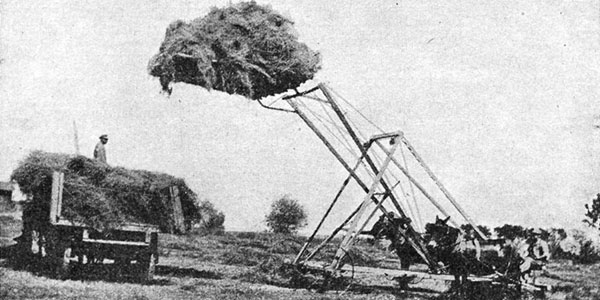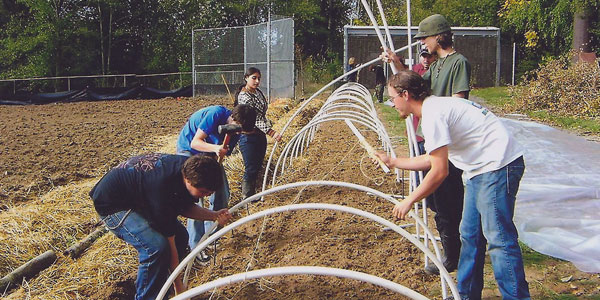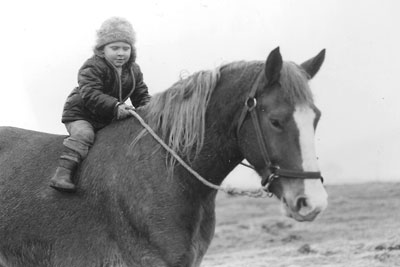Starting Your Farm: Chapter 4
The Small Farmer’s Journal has decided to run editor and publisher Lynn R. Miller’s book Starting Your Farm as a serial series. Below is Chapter 4.
Chapter Four
“If a man would enter upon country life in earnest and test thoroughly its aptitudes and royalties, he must not toy with it at a town distance; he must brush the dew away with his own feet. He must bring the front of his head to the business, and not the back of it.” – Donald G. Mitchell, 1863
MONEY CHANGING HANDS
As we suggested at the opening of this book: Some of you will find this writing simplistic, but evidence is that we need to attack these questions at the most basic level, not just because we have new people looking for introductions but also because many of us can benefit from having our motivations and knowledge questioned and reevaluated.
The price of a farm starts a process that can lead to a greater or lesser total cost. You have a lot of control over the outcome. But you need information. Hopefully you will find some here.
I strongly advise anyone new to these pages to read the first three chapters of this book. Also, as wide and varied a subject as this is, it is impossible to include all elements. Although we’re going over specifics, it is the tone of doubt, inquiry and insistence that is most important to communicate.
Because of the Small Farmer’s Journal we hear from a number of folks buying their first farm. Far too often we get sad stories of tragic mess-ups in the final stages of money changing hands. Can we learn from our mistakes? Yes.
Last chapter we covered some critical preliminary ground covering the researching of properties and listing agreements.
Assuming that you’ve found a farm you want to buy, next you’ll need to determine if you can buy it. If you have sold your property, and/or saved your money, and have the means to buy the farm you are sitting pretty. Best of all possible worlds — congratulations. However, don’t stop reading. There are plenty of pitfalls that can surprise even you. (Perhaps especially you, since unscrupulous people may identify you as a more likely culprit.) Piece of advice: How much money you have, in what form, and where, is nobody’s business but your own.
If you do not have the full price of a considered farm, in cash or any other form, you will likely have to look for financing (or borrowing — and they are not necessarily the same.)
But before we get into that, there is an important- in betwixt- option, trade. If you have property that you want to sell, but haven’t yet, consider trading it for or towards the farm. It isn’t necessary that the farm owner want your property. A realtor with some intelligence and hustle will have the information and means to possibly locate a third property (one the farmer wants) that can tie the deal together as a three-way trade. Oft times the values are different and money also changes hands. But it can work out quite well. It’s too complicated to go into great depth and detail but trading is an important option worth looking into.
FINANCING and/or BORROWING
If you need financial assistance in order to buy the farm, here are some basic rules which vary some from region to region, and with differing particulars.
1) Real Estate Mortgages are usually long term. Long term real estate mortgages are usually written for 10, 15, 20, 30, and 40 year contracts with 20 years being most common. Often contracts can be written with a payment schedule amortized (calculated) for 20 years or so but with the contract maturing at 10 or 15 years. What this means is that you will have a balloon (or considerably larger) payment to pay at the end of the contract. Some big banks prefer this program because it gives them the opportunity to gain interest points and fees if, and when, you choose to rewrite the mortgage to extend its term. For you it’s a device to keep payments lower for the first years. An important procedural tool.
2) Interest rates on long term mortgages can be fixed or variable. Fixed means that you pay the same rate for the duration of the contract whether it’s 9% or 20%. Variable means that the rate goes up or down by a formula usually tied to fluctuations in the prime rate. If you have an opportunity to get a mortgage at 10% or less it may be wise to go fixed. If the prevalent rate is 18% at the time of your purchase it may be wise to go variable. You’ll have to do some math to get the answer that’s right for you.
Interest rates can be a strong bargaining point in contract negotiations. If you’re willing to offer 11% rather than ten, the seller, or the banks, may be willing to extend the term for more years, reduce the price, or throw in some equipment. The opposite might also be true. If you insist on a lower interest rate you may have to accept some other change that might raise the price or cause you some inconvenience.
3) I am of the opinion that a well crafted purchase contract directly with the seller is far superior to dealing with any bank or lending institution. A careful review of banking news, relative to farmlands, over the last 15 years will show a trail of stupidity, greed, avarice, fraud and vulgarity on their part. There are exceptions but they’re becoming fewer and farther apart. With what we out west call, a “land sales contract” (or seller financing) both the buyer and seller can be rewarded.
4) You, the buyer, must either have your own attorney draw up the contracts or at the very least have your own attorney review the contracts BEFORE SIGNING or MONEY TRANSFER!! Do not use the seller’s attorney, the bank’s attorney, or the realtor’s attorney! You want professional help in your employ and on your side.
5) Understand the important differences between an “earnest money agreement and offer” and a “contract to purchase”. (more later)
6) Federally guaranteed loan programs for farmers (i.e. FmHA) were originally conceived to assist beginning farmers who could not get funding elsewhere. They became, and evidence suggests they still are, a money tree for wealthy cronies of elected officials. The extent to which these programs have hurt farmers is evidenced by the long hard hours of legal advocacy work they have generated. Our advice is to stay away from these programs. (We’re not able to speak from experience about G.I. loans. You’ll have to research those.)
7) Insurance companies and fly-by-night mortgage companies make loans to purchase farmland. Their rates are not competitive and their motives are suspect.
8) Lenders usually loan 50% to 75% of the land value.
To summarize: Go for a “land sale contract” with seller. If not possible, be very careful dealing with the other options. Go for a 20 to 30 year amortization with a 10 or 15 year balloon at the lowest possible long term rate of the day. Have your attorney involved.
REALTORS
You’ve hopefully read the previous comments about realtors. It is enough to say here that they are human-beings in a pressure situation selling land for a commission. Unscrupulous or not, they get paid a percentage IF the property sells. They are NOT working for you, the buyer. They are working for themselves. Remember that at all times.
When you find the property you want, you have to get aggressive and take the initiative away from the realtor. Take charge! Read last chapter’s piece on preliminary research. Know what questions to ask.
Then, when you are ready to make an offer, understand that this is the most important stage in the negotiations to buy. It will be difficult or impossible for you to make any significant changes in what you offer (price, terms, interest). You should be prepared to put up some money, to be held in escrow, as a show of your good faith. This is called earnest money. Commonly anything from $500 to $5,000 is offered. This money accompanies an “earnest money agreement and offer to purchase.” In this document which is usually drawn up, on forms, by the realtor (but which can be drawn up by your attorney or can sometimes be purchased as a blank form at larger stationery stores) you will state your purchase offer including:
- How much you are willing to pay.
- How much down payment you offer.
- How it’s to be financed/ what % rate/ length of contact, etc.
- What you want included with purchase.
- That this offer is subject to the contingency that a title search will show clear title, that review of applicable local regulations show no restricted use, and that financing be forthcoming (if other than seller contract).
- That this offer is subject to sale and purchase of said real estate being accepted, completed, and closed by a certain date.
- And any other specifics that are germane.
When this is drawn up make sure that the realtor gives you a very receipt for the earnest money check you give over. But first it is important to have your attorney review the earnest money agreement before you sign and transfer any funds.
I have, in the past, had realtors try to tell me how to word the offer and what price the seller might take. Remember who the realtor works for. The realtor gets more money if the price is higher. You INSIST on your amounts and that the offer be made. The realtor can get into real legal trouble if he or she refuses to submit your offer.
And perhaps this is a good place to insert yet another insistence that you get an attorney to help you. An attorney familiar with real estate contract law can breeze through some of this paperwork in no time at all and $150 spent might save your entire life’s savings. Remember if you hire an attorney to represent you, that attorney represents you.
After the offer is submitted the seller, of course, has the right to refuse or make a counter offer. Once you’ve reached agreement on price and terms I strongly suggest your realtor be involved in the drafting and at least the review of the purchase contract.
Remember that this document, the Purchase Agreement, will be your primary tool of enforcement for any breeches, non-compliance, or enclosures.
If the purchase of the property includes appliances or farm equipment, or crops, be sure that all is spelled out in appropriate addendum to the contract. If the seller is supposed to have something done prior to your occupancy be sure it’s spelled out.
I once made an earnest money offer on a ranch property that was accepted. As we waited for the drafting of the contract, I went out to the property for a picnic to find a big crew cutting down every tree and loading log trucks in a hurry. They were told by the seller that they had 10 days to log it off before the contracts were signed. The earnest money agreement protected me, and we backed out of the purchase- disillusioned but without monetary loss. Next make sure that the escrow company to handle title search, insurance, closing and possibly contract collection is legitimate. Your attorney may be able to help you here.
While waiting for the contract get a copy of the preliminary title report and go over it with your attorney. It may save some surprises later.
Escrow is a special, legal, “third party” service provided so that critical negotiations, contracts and transfers between two or more parties can be transacted without problems.
Closing is a term, in the case of real estate, used to describe that time frame and process during which paperwork, monies and transactions are all enacted.
I recommend that CLOSING always be done in ESCROW!
Title insurance is what it says. A company going business providing insurance on titles will research and provide the ownership status report on a piece of real estate and then be willing to insure that what they report is accurate.
You must get TITLE INSURANCE!
A man I know gave someone cash for 40 acres and was given a written deed. No contracts, no closing, no escrow, no title insurance or reports. Soon after someone came to him claiming he owned the land. After months of investigation it was found out that the land had been sold three times by the same seller and actually belonged to a bank which held security against it for a loan. All three people had to individually sue to get their money back. None ever did.
And don’t be surprised to find out that all these steps and precautions cost money. Normally the buyer and seller share, 50/50, the closing costs which include contract drafting cost, title search and insurance, plus escrow and collection. If there were any back taxes owed against the farm they are usually cleared up within closing. Be careful that someone doesn’t try to stick those, or half of them, on you. Remember, it’s the seller’s obligation to provide you with unencumbered property. Well, we’ve covered a lot of ground in a hurry. There is just no way we can talk about every possible detail. What we mean to do with this is give you the kind of background that will improve your chances for a successful purchase.
The purchase of your farm, a difficult and sometimes confusing process, can and should be completed in a clear, straight forward, and honest manner. Don’t build regret into every future day’s farm labor by allowing yourself to purchase a farm in a questionable process of procedure. Buy it right, buy it clean and then move on to making it work for you.







